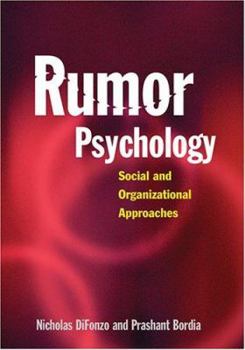Rumor Psychology: Social and Organizational Approaches
In ""Rumor Psychology: Social and Organizational Approaches"", expert rumor researchers Nicholas DiFonzo and Prashant Bordia investigate how rumors start and spread, the accuracy of different types of rumor, and how rumors can be controlled, particularly given their propagation across media outlets and within organizations. Rumors are an enduring feature of our social and organizational landscapes. They attract attention, evoke emotion, incite involvement, affect attitudes and actions - and they are ubiquitous. Rumor transmission is motivated by three broad psychological motivations - fact-finding, relationship-enhancement, and self-enhancement - all of which help individuals and groups make sense in the face of uncertainty. Rumor is closely entwined with a host of social and organizational phenomena, including social cognition, attitude formation and maintenance, prejudice and stereotyping, group dynamics, interpersonal and intergroup relations, social influence, and organizational trust and communication. Organizational rumors, in contrast with natural disaster rumors, tend to be highly accurate, with accuracy being affected by cognitive, motivational, situational, group, and network factors. DiFonzo and Bordia describe how managers can most effectively manage and refute rumors and infer that employee trust in management inhibits rumor activity.
Format:Hardcover
Language:English
ISBN:1591474264
ISBN13:9781591474265
Release Date:November 2006
Publisher:American Psychological Association (APA)
Length:292 Pages
Weight:1.78 lbs.
Dimensions:0.9" x 7.3" x 10.2"
Customer Reviews
0 rating





